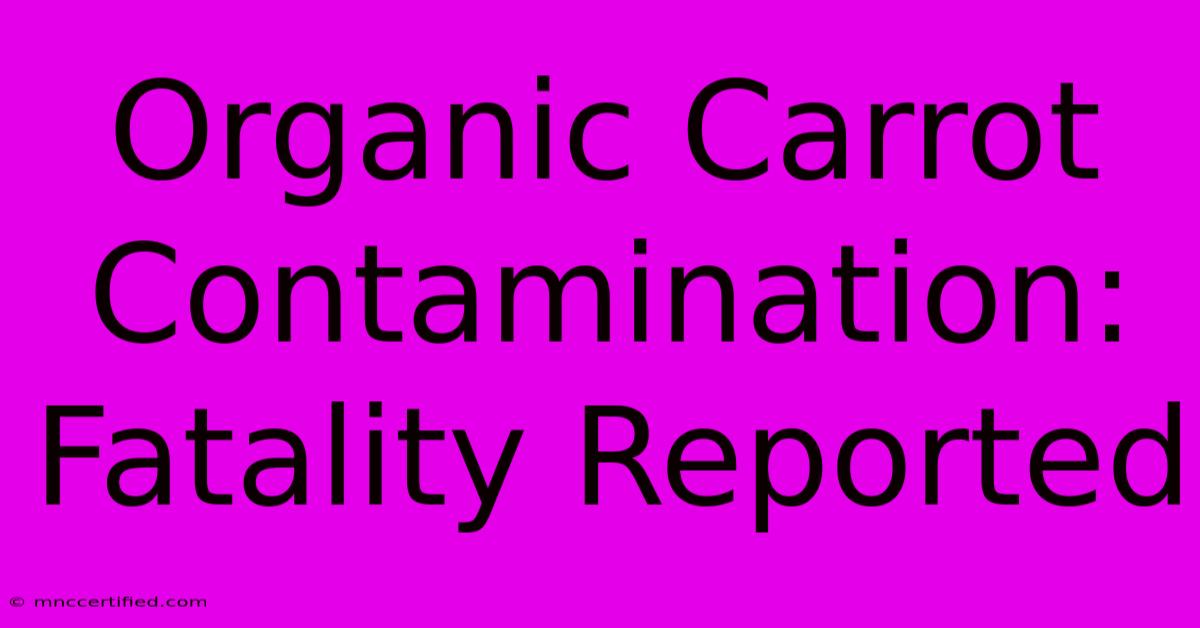Organic Carrot Contamination: Fatality Reported

Table of Contents
Organic Carrot Contamination: Fatality Reported - A Serious Warning
The recent news of a fatality linked to organic carrot contamination has sent shockwaves through the food industry and raised serious concerns about food safety practices, even within the supposedly safer realm of organic produce. This tragic event underscores the critical need for enhanced vigilance throughout the entire food supply chain, from farm to table. This article will delve into the details of this incident, explore potential causes of contamination, and offer crucial advice on how to mitigate risks and ensure the safety of your food.
The Details of the Fatality
While specific details surrounding the fatality may be limited due to ongoing investigations and privacy concerns, initial reports point to a rare but potent bacterial contamination of organic carrots. The exact strain of bacteria involved is yet to be officially confirmed, but investigations are underway to determine the source of the contamination and the extent of the outbreak. This emphasizes the unpredictable nature of foodborne illnesses and the potential dangers lurking even in seemingly healthy food choices.
The Importance of Transparency
The lack of immediate and detailed information surrounding the contamination highlights the importance of transparency in the food industry. Consumers deserve clear, timely updates regarding potential food safety risks. Open communication fosters trust and empowers individuals to make informed choices about their health and wellbeing. We urge regulatory bodies to investigate this incident thoroughly and ensure that all relevant information is made public in a timely and accessible manner.
Potential Sources of Contamination: A Closer Look
Several factors could contribute to the contamination of organic carrots, and it's crucial to explore them thoroughly to prevent future incidents. These potential sources include:
- Soil Contamination: Harmful bacteria can persist in the soil, potentially infecting the carrots during growth. Improper irrigation practices or contaminated manure could contribute to this.
- Harvesting and Handling: Contamination can occur during harvesting, processing, or packaging if proper hygiene and sanitation protocols aren't followed. Cross-contamination with other contaminated products is also a possibility.
- Storage and Transportation: Inadequate storage and transportation conditions can create environments favorable for bacterial growth, potentially leading to widespread contamination.
Organic Certification and Food Safety
It's crucial to remember that organic certification does not guarantee complete freedom from contamination. While organic farming practices often aim for greater environmental sustainability and minimize the use of synthetic pesticides, they don't eliminate the risk of bacterial contamination entirely. This fatality serves as a reminder that robust food safety protocols are vital across all farming methods.
Protecting Yourself: Key Steps to Take
In light of this tragic event, consumers should take proactive steps to minimize their risk of foodborne illnesses:
- Thorough Washing: Wash all produce thoroughly under running water before consumption. Scrubbing with a vegetable brush can help remove dirt and potential contaminants.
- Proper Storage: Store carrots and other produce correctly to prevent bacterial growth. Refrigeration is essential.
- Cooking: Cooking carrots at high temperatures can kill many harmful bacteria.
- Awareness of Symptoms: Be aware of symptoms of food poisoning (nausea, vomiting, diarrhea, fever) and seek medical attention immediately if you suspect contamination.
- Stay Informed: Stay informed about food safety recalls and advisories issued by relevant authorities.
Conclusion: The Urgent Need for Action
The fatality linked to organic carrot contamination highlights a critical need for improved food safety practices across the entire supply chain. This incident demands a thorough investigation to identify the source of contamination and implement preventative measures to ensure the safety of our food supply. Consumers must remain vigilant and take proactive steps to protect their health. Only through collaborative efforts between farmers, processors, retailers, and regulatory bodies can we hope to prevent future tragedies. The safety of our food should be a paramount concern, and this event underscores the urgent need for action.

Thank you for visiting our website wich cover about Organic Carrot Contamination: Fatality Reported. We hope the information provided has been useful to you. Feel free to contact us if you have any questions or need further assistance. See you next time and dont miss to bookmark.
Featured Posts
-
Bo Nix For Fed Ex Player Of The Week
Nov 19, 2024
-
Trump Dance Sweeps Sports
Nov 19, 2024
-
Angelina Jolies Elegant Night Out
Nov 19, 2024
-
Met Office Alert Snow Ice In Northwest England
Nov 19, 2024
-
Wasps Defeat Super Eagles Highlights
Nov 19, 2024